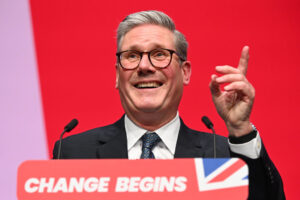In the Seventies, a Middle Eastern war precipitated a global energy shock and stagflation, and a US president invoked populist pleas to the silent majority against the counterculture. As the gold standard and the post-war Bretton Woods system teetered on the brink of collapse, the monetarist economist Milton Friedman observed that “only a crisis — actual or perceived — produces real change. When that crisis occurs, the actions that are taken depend on the ideas that are lying around.”
Today we have a surplus of crises but a deficit of ideas lying around. There has been no significant wage growth in the UK for more than a decade. Productivity has flatlined. The political convulsions of Scottish separatism, Corbynism and Brexit have rocked established politics. The economy has been battered by the quick succession of a global pandemic and proliferating geopolitical tremors. Trust in the political class has never been lower, as Westminster’s elites flounder around looking for the levers that say “activate new growth model”.
Against all this, Rachel Reeves’s Budget will offer up the kind of Fabian reforms one might expect from a former Bank of England bureaucrat: public accounting tweaks that alter the measures of public assets versus liabilities on the balance sheet, which should free up significantly more capital for an investment-starved public realm. After a long period in which the UK has seriously neglected its fixed assets and capital stock, an overdue focus on restorative projects with broad multipliers, in energy, transport and housing, could help nudge growth upwards.
The question is whether Labour’s incrementalism and promises of delayed gratification will satisfy a restless public. “Fixing the foundations” is hardly an alluring slogan when those economic foundations are functionally imperceptible to most people. The tangibility and immediacy of an increase in the bus fare cap will surely have more cut-through than broad-brush promises of “a decade of renewal”, especially when the British public has stopped listening to much of what politicians have to say anyway. Reeves seems intent on burning through piles of goodwill and political capital to pursue negligible cost savings.
Perhaps Labour’s biggest problem is the lack of a coherent narrative thread that binds its policy choices together. It won the election by successfully appearing as the inoffensive, default option against incumbents who were visibly wearied by 14 years in power. But there was no ideological bedrock underlying their campaign. There have been only vague nods towards a post-neoliberal “securonomics”, edging towards a more interventionist, activist state encapsulated by GB Energy, the National Wealth Fund, and the New Deal for Workers.
This series of scattered and languid proposals do not make up the kind of paradigm shift that would be required to trigger a genuine reindustrialisation of left-behind Britain, or a spurt of rapid, sustained growth via the energy transition — the preferred route of the so-called “modern-supply-side” advocates in Labour-aligned think tanks. It all looks rather like a reheated Johnsonism, condemned by the Right at the time as “neo-Brownite social-democracy” and “green paternalism”.
It’s doubtful whether such a vision, structured to align with “Bidenomics” in the US and designed to expand domestic green industrial capacities, could be achieved by a low-productivity service economy heavily reliant on imported manufactures and cheap labour. Even for Joe Biden, the pouring of hundreds of billions of government money into green investments and social programmes did little to improve his personal popularity ratings. America’s now cross-party consensus on decoupling and trade protectionism is unlikely to translate here: ambitious stimulus programmes are more difficult to finance when you don’t enjoy the exorbitant privilege afforded by the US dollar system. And for all the talk of creating new domestic supply chains, the turbines, solar panels and cables that will power the switch to renewables will likely continue to be made in faraway lands with more successful adherence to developmentalist industrial policy.
If not British Bidenomics, then what? It seems that the well of ideas has run dry. Yet our country wasn’t always so intellectually slothful. Half a century ago, at the last nadir of what the Soviet economist Nikolai Kondratiev would have described as a “long wave” of growth and slump, an epochal battle of ideas played out. On one side, there was a resurgent neoliberal Right with the ailing social-democratic consensus in their sights, and on the other a socialist Left advocating for an alternative economic strategy: public ownership, withdrawal from the European Economic Community, and a revitalised production walled behind tariffs, state planning agreements and price controls. This was the kind of autarkic, Left-wing economic nationalism purveyed by a young Jeremy Corbyn and his mentor Tony Benn.
In the end, the Right emerged as champions. The success of Thatcherism in presenting itself as the authentic voice of Middle England — and even attracting the support of many working-class voters in alliance with a reinvigorated City of London — means that the vision of the neoliberal Right has defined the political economy of the past 40 years.
For better or for worse, a new model emerged from the last crisis. But there has been no such luck in Britain today, on the Left or Right. Thatcherism’s defeat of the Left and its institutions was so total, and the embrace of market managerialism so widespread, that any grasping towards an alternative has been treated as utopian. We now lack the hegemonic infrastructure, the will, the capacities, and the political imagination to define a project that would contradict the whims of a faceless disciplining agent we call the bond markets.
Recent rejuvenation attempts have largely failed. Brexit, which promised a contradictory amalgamation of a free-trading Global Britain, a low-tax Singapore-on-Thames, alongside a more robust statism that insulated workers from steady influxes of migrant labour. The tension in that project is yet to be resolved. Corbynism, meanwhile, offered salvation to urban progressives, a “socialism with an iPad” that toyed with ideas such as a universal basic income, a four-day week, and supposedly new, co-operative forms of public ownership for a 21st-century economy. Its millennial socialist tendency sat alongside more traditional, social-democratic and Left-populist calls for green Keynesianism, workers on company boards, higher minimum wages, more police officers and a rejection of austerity. But despite the popularity of its individual policies, the Labour Left was widely seen as representing an effete, metropolitan activist class, obsessed with issues that were alien to most of the electorate. This was a party that could spend entire summers arguing about antisemitism, Corbyn’s former associations with militant Islamists and provisional Republicans, and ubiquitous equivocations over what constitutes a woman.
The failure of contemporary Labour Leftism, then, is rooted in the fact that the potential for social democracy is being constantly foiled by an extreme adherence to cultural ultra-liberalism on the one hand — with gender self-ID, police and prison abolition, open borders or support for reparations taken as unassailable axioms — and militant, vocal sympathy with ultra-conservative terrorist groups on the other. It’s a contradictory package almost lab-designed to repel a public that is broadly sympathetic with more anodyne promises of wealth redistribution, a more muscular statism, or investment-led growth and reindustrialisation.
If the Left is failing to conjure a workable political vision, then the Right is faring little better. The noises from the Conservative leadership contest signal little more than a desire to relitigate culture wars and restate commitments to a deregulatory agenda and small-state, low-tax principles. But elements of free-marketeer policy prescriptions have crept into Labour discourse, too, via the intoxicating panacea offered by Yimbyism. Six weeks ago, political Twitter was abuzz with talk of an essay about planning reform called “Foundations: Why Britain has Stagnated”. In 16,000 words, it offered up an answer to Britain’s perpetual stagnation: building regulations set by Clement Attlee. These ideas have become part of Westminster common sense, and Labour seems keen to pursue them. Push through planning reform, the SW1 wonks say, and we can get Britain building again, unlocking entrepreneurial animal spirits and creating a great sea of new-builds, with Barratt Britain as Keir Starmer’s Krushchevka.
Though these ideas have infiltrated the Westminster zeitgeist, nobody in the real world is listening. On the street, you’d struggle to find anyone with an opinion on planning reform. For the micro-class of policymakers and their adjuncts in the media, political advocacy and corporate consultancy, talk our byzantine planning system is ubiquitous. The Labour front bench will be praying their fixes to the issue deliver a Big Bang moment, bringing much-needed extra revenues to the Treasury.
But planning reform does not constitute a new growth model. Nor will it deliver the enormous amounts of extra money that will be required to restore services and state capacity. For the analysis in “Foundations” does not account for the real moment of divergence for Britain’s post-war growth trajectory — 2008. Since the government pumped billions into the financial system following the collapse of trans-Atlantic banking, both political parties have struggled to find a replacement for a zombie form of highly financialised capitalism. It limps on life support, delivered in the form of quantitative easing, a decade of negative real interest rates, bailouts, and now a trend for what business groups describe as “de-risking” and “crowding in”, the new “productivist” cover for corporate subsidy.
Our era of stagnation has produced extreme political ramifications as the old party system hangs on by a thread, despondency and cynicism reign supreme, and the legitimacy of the entire political class has been thrown into question by the endless failure to deliver. The Italian Marxist Antonio Gramsci would have defined it as an interregnum, a transitory period of chaotic impulses when “the old is dying, but the new cannot be born”. Previous eras of stagnation or decline have produced broad-based movements and ideas that have done away with the old and welcomed in the new. Yet today’s Budget will certainly not end our long interregnum.
Disclaimer
Some of the posts we share are controversial and we do not necessarily agree with them in the whole extend. Sometimes we agree with the content or part of it but we do not agree with the narration or language. Nevertheless we find them somehow interesting, valuable and/or informative or we share them, because we strongly believe in freedom of speech, free press and journalism. We strongly encourage you to have a critical approach to all the content, do your own research and analysis to build your own opinion.
We would be glad to have your feedback.
Source: UnHerd Read the original article here: https://unherd.com/



